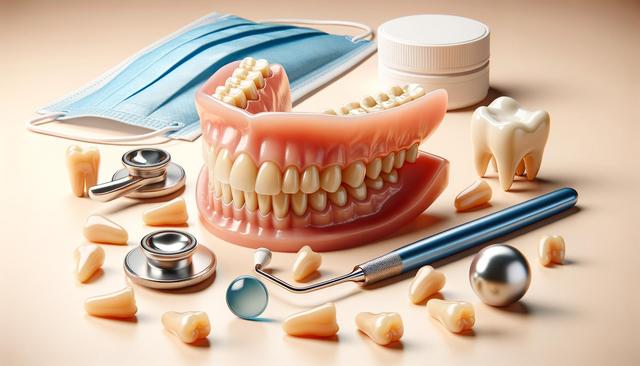Understanding Dentures: A Practical Guide to Restoring Your Smile
Dentures offer a reliable solution for individuals who have lost some or all of their natural teeth.

What Are Dentures and Who Needs Them?
Dentures are removable appliances designed to replace missing teeth and surrounding tissues. They come in two main types: complete dentures for those who have lost all their teeth, and partial dentures for individuals who still retain some natural teeth. Losing teeth can occur due to various reasons, including aging, gum disease, tooth decay, or trauma. Dentures can help restore function and appearance, allowing individuals to eat, speak, and smile with confidence. Whether you’re missing a few teeth or require a full dental replacement, dentures can be a practical and beneficial solution.
For those considering dentures, it’s important to consult with a dental professional. A comprehensive examination will help determine the most suitable type, material, and fit. This decision is influenced by factors such as oral health status, bone structure, and personal preferences. In many cases, dentures can significantly improve quality of life, especially when tailored to an individual’s specific needs.
Types of Dentures Available
There are several types of dentures available, each serving different needs and preferences. Understanding these options can help individuals make informed decisions when restoring their dental health. The main types include:
- Complete Dentures: Used when all teeth are missing, these can be conventional or immediate. Immediate dentures are placed right after teeth removal, while conventional ones are fitted after the gums have healed.
- Partial Dentures: Ideal for those who still have some natural teeth remaining, partial dentures fill in the gaps and prevent other teeth from shifting.
- Implant-Supported Dentures: These are anchored to dental implants, offering greater stability and a more natural feel.
- Flexible Dentures: Made from softer materials, these provide more comfort and are less likely to cause irritation.
Each type has its own set of advantages and potential drawbacks. The choice often depends on budget, aesthetic goals, and oral anatomy. A dental consultation can guide patients toward the best option for their situation.
The Denture Fitting Process
The process of getting dentures typically involves several steps, starting with an initial consultation. During this visit, the dentist examines the mouth, takes measurements, and discusses treatment options. If extractions are needed, they are performed before the fitting process begins. Afterward, impressions of the gums and any remaining teeth are taken to ensure a custom fit.
Once the dentures are fabricated, a fitting appointment is scheduled. Adjustments may be required to enhance comfort and functionality. It’s not uncommon for patients to need a few follow-up visits to fine-tune the fit. The goal is to create a secure and comfortable denture that feels as natural as possible.
Patients may experience an adjustment period while getting used to their dentures. This can involve minor discomfort, difficulty speaking, or changes in eating habits. However, with time and patience, most individuals adapt successfully.
How to Care for Dentures
Proper care and maintenance of dentures are essential for ensuring their longevity and maintaining oral health. Dentures should be cleaned daily to remove food particles, plaque, and bacteria. Using a non-abrasive denture cleaner and a soft brush is recommended. Avoid using regular toothpaste, as it can be too harsh.
- Rinse dentures after meals to remove debris.
- Soak them overnight in a denture-cleaning solution to keep them moist and prevent warping.
- Handle dentures carefully to avoid dropping and damaging them.
- Schedule regular dental checkups to monitor oral health and denture condition.
It’s also important to clean the gums, tongue, and any remaining natural teeth daily. Good oral hygiene supports the fit and comfort of dentures and helps prevent issues like gum irritation or bad breath.
Benefits and Limitations of Dentures
Dentures provide numerous benefits, including improved appearance, better speech, and restored chewing ability. They can also help prevent facial muscles from sagging, which often occurs after tooth loss. For many, the psychological benefit of regaining a confident smile is just as valuable as the functional improvements.
However, dentures also have limitations. They may not offer the same level of stability or biting force as natural teeth or dental implants. Some individuals may find them less comfortable or require frequent adjustments. Despite these challenges, modern dentures are designed to be more durable and lifelike than ever before.
By working closely with a dental professional, individuals can maximize the advantages of dentures while addressing potential concerns. With proper care and realistic expectations, dentures can offer a practical and effective solution for tooth loss.
Conclusion: Is It Time to Consider Dentures?
For those experiencing tooth loss, dentures can be a valuable tool in restoring both function and confidence. While they may require an adjustment period and ongoing maintenance, the benefits often outweigh the inconveniences. Whether you’re exploring complete or partial dentures, understanding your options and working with a qualified dental provider can lead to a better outcome. Taking the first step toward improving your oral health can make a lasting difference in your overall well-being.